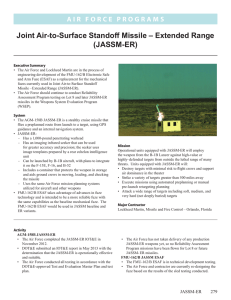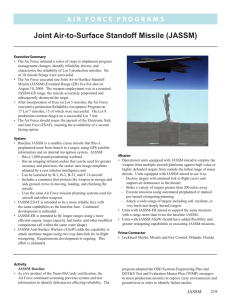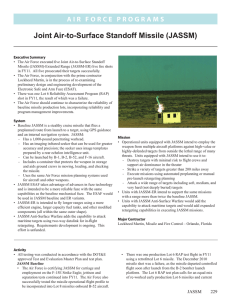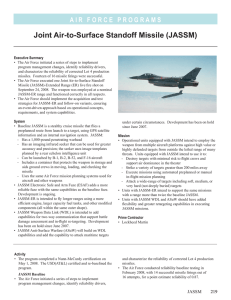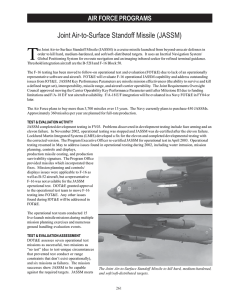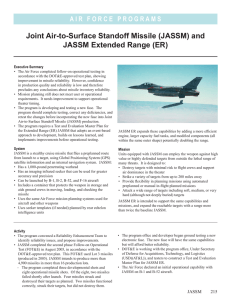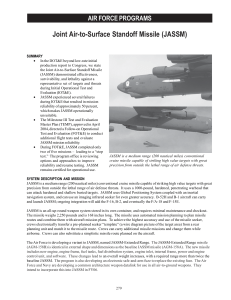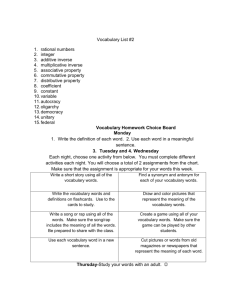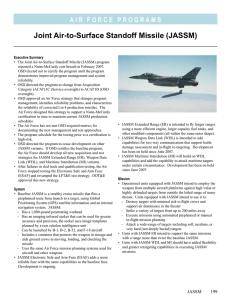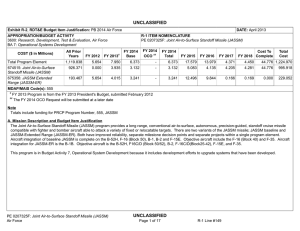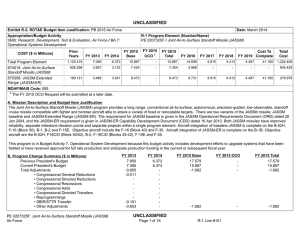Joint Air-to-Surface Standoff Missile (JASSM)
advertisement
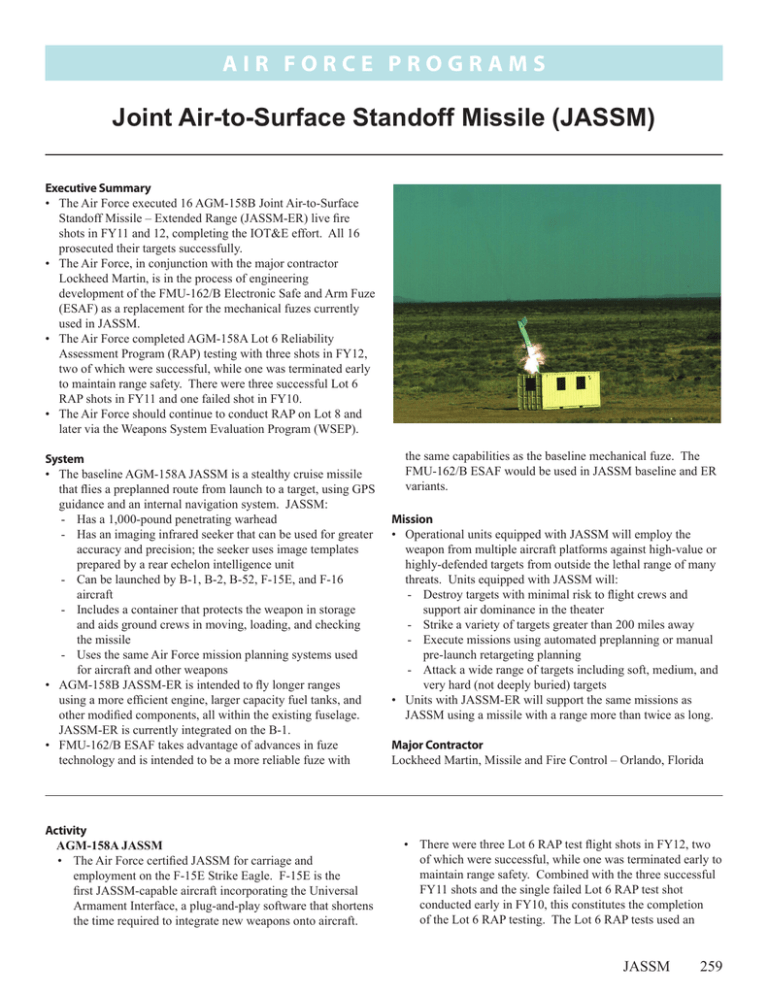
A i r F o r c e P RO G R A M S Joint Air-to-Surface Standoff Missile (JASSM) Executive Summary • The Air Force executed 16 AGM-158B Joint Air-to-Surface Standoff Missile – Extended Range (JASSM-ER) live fire shots in FY11 and 12, completing the IOT&E effort. All 16 prosecuted their targets successfully. • The Air Force, in conjunction with the major contractor Lockheed Martin, is in the process of engineering development of the FMU-162/B Electronic Safe and Arm Fuze (ESAF) as a replacement for the mechanical fuzes currently used in JASSM. • The Air Force completed AGM‑158A Lot 6 Reliability Assessment Program (RAP) testing with three shots in FY12, two of which were successful, while one was terminated early to maintain range safety. There were three successful Lot 6 RAP shots in FY11 and one failed shot in FY10. • The Air Force should continue to conduct RAP on Lot 8 and later via the Weapons System Evaluation Program (WSEP). System • The baseline AGM-158A JASSM is a stealthy cruise missile that flies a preplanned route from launch to a target, using GPS guidance and an internal navigation system. JASSM: - Has a 1,000-pound penetrating warhead - Has an imaging infrared seeker that can be used for greater accuracy and precision; the seeker uses image templates prepared by a rear echelon intelligence unit - Can be launched by B-1, B-2, B-52, F-15E, and F-16 aircraft - Includes a container that protects the weapon in storage and aids ground crews in moving, loading, and checking the missile - Uses the same Air Force mission planning systems used for aircraft and other weapons • AGM-158B JASSM-ER is intended to fly longer ranges using a more efficient engine, larger capacity fuel tanks, and other modified components, all within the existing fuselage. JASSM-ER is currently integrated on the B-1. • FMU-162/B ESAF takes advantage of advances in fuze technology and is intended to be a more reliable fuze with Activity AGM-158A JASSM • The Air Force certified JASSM for carriage and employment on the F-15E Strike Eagle. F-15E is the first JASSM-capable aircraft incorporating the Universal Armament Interface, a plug-and-play software that shortens the time required to integrate new weapons onto aircraft. the same capabilities as the baseline mechanical fuze. The FMU-162/B ESAF would be used in JASSM baseline and ER variants. Mission • Operational units equipped with JASSM will employ the weapon from multiple aircraft platforms against high-value or highly-defended targets from outside the lethal range of many threats. Units equipped with JASSM will: - Destroy targets with minimal risk to flight crews and support air dominance in the theater - Strike a variety of targets greater than 200 miles away - Execute missions using automated preplanning or manual pre-launch retargeting planning - Attack a wide range of targets including soft, medium, and very hard (not deeply buried) targets • Units with JASSM-ER will support the same missions as JASSM using a missile with a range more than twice as long. Major Contractor Lockheed Martin, Missile and Fire Control – Orlando, Florida • There were three Lot 6 RAP test flight shots in FY12, two of which were successful, while one was terminated early to maintain range safety. Combined with the three successful FY11 shots and the single failed Lot 6 RAP test shot conducted early in FY10, this constitutes the completion of the Lot 6 RAP testing. The Lot 6 RAP tests used an JASSM 259 A i r F o r c e P RO G R A M S equal mix of re-worked early production Lot 6 missiles and current configuration Lot 6 missiles, ensuring adequate and equal testing of both variants. AGM-158B JASSM-ER • The Air Force executed 16 JASSM-ER live fire shots in FY11 and 12. All 16 JASSM-ER missiles engaged and destroyed their targets at both nominal and maximum JASSM-ER ranges. FMU-162/B JASSM ESAF • The FMU-162/B ESAF currently is funded by the major JASSM contractor. The Air Force, in conjunction with the major contractor, is in the process of re-design and engineering development of the FMU-162/B ESAF as an option to replace the existing mechanical fuze and thereby increase JASSM and JASSM-ER reliability. • The Air Force conducted all testing in accordance with the DOT&E-approved Test and Evaluation Master Plan and test plan. Assessment AGM-158A JASSM • An April 2011 DOT&E memorandum stated that the Air Force needed to execute a minimum of 6 RAP flights to demonstrate an 80 percent confidence level that Lot 6 is more reliable than Lot 5. Currently, the RAP shots following the first failure have been successful. Omitting the one flight that range-safety terminated due to crew error, RAP testing has demonstrated improved reliability over Lot 5. • Despite improvements in workmanship and production processes, there is still a need to evaluate the inherent 260 JASSM reliability of production lot missiles (through Lot 8, at a minimum) to ensure that the reliability growth plan is successful. The Air Force should accomplish Lot 8 and later RAP testing via the WSEP. AGM-158B JASSM-ER • The 16 JASSM-ER shots indicate that the JASSM-ER meets requirements. These 16 tests, in combination with 5 approved production-representative integrated test shots, successfully conclude the IOT&E. There was a single failure (IT-8) in 21 test events. FMU-162/B JASSM ESAF • The FMU-162/B ESAF program has the potential to increase the overall reliability of all JASSM variants. The FMU-162/B ESAF program would replace the current electro-mechanical fuze, which relies on moving parts prone to reliability failures. In addition, the FMU-162/B ESAF has more built-in test capability than the current electro‑mechanical FMU-156/B ESAF. Recommendations • Status of Previous Recommendations. The Air Force continued to characterize the reliability of baseline missile production lots with the completion of the Lot 6 RAP. • FY12 Recommendations. The Air Force should: 1. In conjunction with the contractor, continue the development and evaluation of the FMU-162/B ESAF. 2. Continue RAP for Lot 8 and later via the WSEP.
